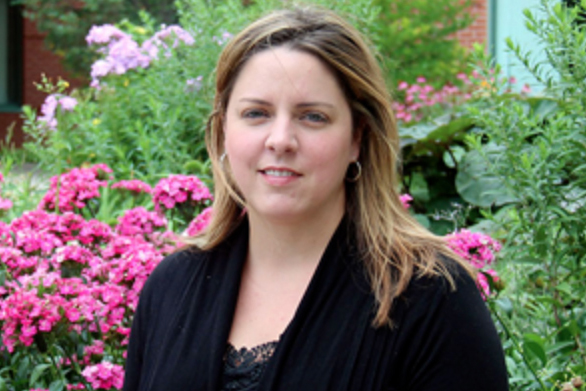New Weston Family Visiting Professor in Ecosystem Health and Food Security Appointed at Cape Breton University
International pollination expert to study regional ecosystem health impacts and oversee the recreation of Mabel Bell’s historic gardens at Alexander Graham Bell National Historic Site
 Dr. Alana Pindar joins Cape Breton University as the newly appointed Weston Family Visiting Professor in Ecosystem Health and Food Security. She will collaborate closely with Parks Canada, Bell Family members, and the Alexander Graham Bell Foundation to monitor pollinator activity surrounding the reconstruction of Mabel Bell’s gardens, providing over a century’s worth of base-line insights. Originally from Cape Breton, Dr. Pindar, an international expert in her field, will study, manage, and mitigate ecosystem health challenges relating to pollination while promoting wellness in Atlantic Canada.
Dr. Alana Pindar joins Cape Breton University as the newly appointed Weston Family Visiting Professor in Ecosystem Health and Food Security. She will collaborate closely with Parks Canada, Bell Family members, and the Alexander Graham Bell Foundation to monitor pollinator activity surrounding the reconstruction of Mabel Bell’s gardens, providing over a century’s worth of base-line insights. Originally from Cape Breton, Dr. Pindar, an international expert in her field, will study, manage, and mitigate ecosystem health challenges relating to pollination while promoting wellness in Atlantic Canada.
“We are so pleased to welcome Dr. Pindar back to Cape Breton and thrilled that she is bringing her expertise to Cape Breton University. With her global reputation and focus on health and wellness of ecosystems, Dr. Pindar will help us deliver on our commitments in our strategic plan and bring forth new opportunities that align with our academic and research goals. It is wonderful to see a professional of Dr. Pindar’s calibre return to Cape Breton with her family to make an impact in our community,” says David C. Dingwall, President & Vice-Chancellor, Cape Breton University.
Inspired by Dr. Pindar’s focus in recent years, the Weston Family Foundation has funded her research and her initiatives surrounding food security in Atlantic Canada.
Dr. Pindar has made substantial contributions to her field. In 2015, as a postdoctoral fellow at the University of Ottawa, she co-authored a significant paper in the journal, Science, on the responses of bumblebees to climate change around the world, which was broadcasted across 57 media outlets and was featured in TIME magazine.
In 2016, as part of her second postdoctoral fellowship at the University of Guelph, she produced a report on the Status and Trends for Pollinator Health in Ontario for the Ontario Ministry of Agricultural and Rural Affairs. This report played a significant role in underpinning the first provincial Pollinator Health Strategy in Canada. She was recognized, in 2016, with the prestigious Webster Postdoctoral Fellowship in Environmental Sciences.
“I am delighted to bring my research, and research partners, in ecosystem services and food security back to my roots, Cape Breton,” says Dr. Pindar “There has never been more of a crucial time to bring these topics to the discussion at every dinner table in Cape Breton. I look forward to enhancing CBU’s initiatives in these fields, collaborating with key island stakeholders and CBU faculty on these crucial topics.”
On her work with the Alexander Graham Bell Foundation and Mabel Bell’s garden, Mary Tulle, Chairperson of the Foundation says, “The brilliance of Mabel Bell was so very evident with how she planted and managed her gardens over 100 years ago. Having them recreated under the guidance of Dr. Pindar will share so much about Mabel Bell that would never before be known.”
Foundational to all her work is championing the important role of women in science and technology. She is an active and proud member of WISE-Atlantic and continues to mentor female high school students in Atlantic Canada.